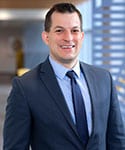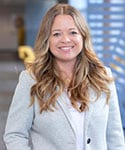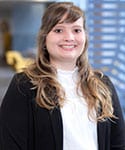Curriculum
/prod01/channel_2/media/mccms/content-assets/academics/health-sciences-training/respiratory-care-program-minnesota/respiratory-care-program-3734290-0034-content.jpg)
time spent in clinical settings
time spent in labs
time spent in classroom
Student experiences
Classroom learning
Students are first introduced to the respiratory therapy field through topics that include patient assessment, laboratory and chest X-ray interpretation, oxygen therapy, and medication delivery. You’ll then move on to more advanced topics like mechanical ventilation, pathophysiology, cardiopulmonary diagnostic testing, and hemodynamic monitoring.
Labs and simulation
Before entering any clinical care setting, you’ll first practice the skills you learned in one of our labs or simulation centers, sometimes working with live actors.
Hands-on clinical rotations
Mayo Clinic is among the largest, most advanced medical centers in the world. Your clinical education will primarily take place at Mayo Clinic Hospital, Saint Marys Campus, a 1,157-bed facility. Within Saint Marys Campus is the 85-bed Mayo Eugenio Litta Children's Hospital. Students also have rotations within Mayo Clinic Health System.
Facilities and faculty
Learn more about the facilities and faculty of the Respiratory Care Program (Minnesota).
Facilities
The Mayo Clinic campus in Rochester, Minnesota, includes an extensive outpatient complex, Mayo Clinic Hospital, Saint Marys Campus; Mayo Clinic Hospital, Methodist Campus; and substantial research and education facilities.
This Mayo Clinic site is among the largest, most advanced medical centers in the world.
Primarily, clinical education is conducted at Mayo Clinic Hospital, Saint Marys Campus, a 1,157-bed facility that was founded in 1889. Within Saint Marys Campus, is the 85-bed Mayo Eugenio Litta Children's Hospital. Students also have rotations within Mayo Clinic Health System.
Teaching faculty
We have a dedicated team that educates, supervises, and mentors respiratory care students as they rotate through the specialty rotations.
Your instructors are trained respiratory care therapists. They are chosen for their commitment to teaching as well as their expertise in providing respiratory testing and care.
 |
Brendan Wanta, M.D. Brendan Wanta joined the Respiratory Care Program in 2021. Originally from Milwaukee, WI, he attended the University of Wisconsin-Madison for an undergraduate degree and the Medical College of Wisconsin for his Doctor of Medicine degree. He completed a residency in anesthesiology in 2015 followed by a fellowship in critical care medicine. He is an Assistant Professor of Anesthesiology and Perioperative Medicine in the Division of Critical Care Medicine and board-certified by the American Board of Anesthesiology in general anesthesiology and critical care medicine. Dr. Wanta is not only involved in the Respiratory Care Program, but also serves as a core faculty member for the Anesthesiology Residency at Mayo Clinic in Rochester. He has received multiple awards for education and clinical service. Outside of work, Dr. Wanta enjoys live music, exploring the State and National Park Service parks, and learning about various cultures. He looks forward to getting to know all the students in the Respiratory Care Program. |
 |
Stephanie Holst, R.R.T., L.R.T. Stephanie Holst joined the Respiratory Care Program as adjunct faculty in 2013. She later joined the program as the clinical coordinator in 2019. She graduated from Mayo Clinic School of Health Science/University of Minnesota in 2011 with a bachelor’s degree of Applied Science in Respiratory Care. She went on to achieve her Master of Science degree in Leadership from Northeastern University. She holds academic rank as an instructor in anesthesiology at Mayo Clinic College of Medicine and Science. Ms. Holst has worked as a Registered Respiratory Therapist in a variety of settings at Mayo Clinic, such as critical care, emergency medicine, and education. She is passionate about educating incoming professionals and has served as an education specialist and supervisor of education within the Respiratory Care Department at Mayo Clinic. Ms. Holst’s teaching interests include experiential learning, physiology, pulmonary hemodynamics, and mechanical ventilation. Her research interests include interdisciplinary professional education, second-victim experiences, and adult learning. |
 |
Amanda Boyson, R.R.T., L.R.T. Ms. Amanda Boyson joined the Respiratory Care Program as adjunct faculty in 2019 and as the clinical coordinator in 2022. Ms. Boyson graduated in 2016 with a bachelor's degree in respiratory care from Mayo Clinic School of Health Sciences/University of Minnesota-Rochester. She went on to achieve her Master of Science in Respiratory Care-Adult and Organizational Learning from Northeastern University in 2022. Ms. Boyson’s career as a Registered Respiratory Therapist included working in a variety of areas within Mayo Clinic, such as critical care, general care, emergency medicine, education, and ECMO. Her passion and dedication regarding respiratory care is reflected in her desire to educate others. Ms. Boyson’s teaching interests include professionalism, hemodynamics, airway management, emergency care, and experiential learning. Outside of work, Ms. Boyson likes to spend her free time with her family and enjoys exploring the outdoors. |
Hours
For the majority of the Respiratory Care Program, your learning schedule will include eight-hour and 12-hour days, five days a week.
Course sequence
There are a total of 61 credits in the program.
Junior year: Fall semester (15 credits)
| Number | Course | Credits |
|---|---|---|
|
RESP 3011 |
Foundations of Respiratory Care |
2 |
|
HP 3021 |
Patient Care Techniques |
1 |
|
RESP 3101 |
Respiratory Care Modalities and Equipment |
4 |
|
RESP 3201 |
Cardiopulmonary Patient Assessment |
4 |
|
RESP 3301 |
Clinical Practicum I |
3 |
|
RESP 3401 |
Seminar in Respiratory Care I |
1 |
Junior year: Spring semester (14 credits)
| Number | Course | Credits |
|---|---|---|
|
RESP 3102 |
Respiratory Care Modalities and Equipment II |
4 |
|
RESP 3202 |
Advanced Cardiopulmonary Physiology and Pathophysiology |
3 |
|
RESP 3302 |
Clinical Practicum II |
3 |
|
RESP 3402 |
Seminar in Respiratory Care II |
1 |
|
RESP 3502 |
Clinical Research: Literature, Methodology, and Application |
3 |
Senior year: Summer semester (7 credits)
| Number | Course | Credits |
|---|---|---|
|
RESP 3800 |
Pharmacotherapy for the Health Professions |
3 |
|
RESP 4300 |
Clinical Practicum |
2 |
|
RESP 4400 |
Advanced Adult Respiratory Critical Care Techniques I |
2 |
Senior year: Fall semester (12 credits)
| Number | Course | Credits |
|---|---|---|
|
RESP 4500 |
Advanced Adult Respiratory Critical Care Techniques II |
1 |
|
RESP 4311 |
Advanced Perinatal and Pediatric Respiratory Care |
3 |
|
RESP 4321 |
Advanced Cardiopulmonary Diagnostics |
2 |
|
RESP 4331 |
Cardiopulmonary Rehabilitation, Disease Prevention and Case Management |
1 |
|
RESP 4341 |
Clinical Practicum III: Advanced Respiratory |
3 |
|
RESP 4401 |
Clinical Practicum IV: Advanced Adult Respiratory Critical Care |
1 |
|
RESP 4501 |
Research Project |
1 |
Senior year: Spring semester (13 credits)
| Number | Course | Credits |
|---|---|---|
|
RESP 4342 |
Clinical Practicum V: Advanced Respiratory Care |
3 |
|
RESP 4402 |
Clinical Practicum VI: Advanced Adult Respiratory Critical Care |
2 |
|
RESP 4502 |
Research Project II |
1 |
|
RESP 4602 |
Grand Rounds |
2 |
|
HP 4802 |
Health Economics and Finance |
3
|
|
HP 4902 |
Management and Leadership in Health Care |
2 |
Grading or evaluation
As you move through the respiratory care rotations, you’ll be evaluated in each clinical area by the supervising therapists, the program director and the clinical supervisor. Clinical performance is evaluated using a competency-based evaluation system and performance appraisals.
Mayo Clinic School of Health Sciences uses these evaluative tools:
- Written examination
- Demonstration of skills
- Self-assessment exercises
- Faculty reviews
Mayo's system of evaluation provides students and faculty with a comprehensive look at individual performance. This allows faculty and administrative staff to direct students who are experiencing academic difficulty to the appropriate support resources, including tutoring programs and counseling opportunities.
Graduation and certification
Students participate in an extensive exam review before the end of the junior and senior year. After successful completion of the senior-year course work, you’re eligible to complete the National Board of Respiratory Care (NBRC) board examinations to get the Registered Respiratory Therapist (RRT) credential.
When you successfully complete the Respiratory Care Program, you’ll receive a Bachelor of Science in Health Professions from the University of Minnesota Rochester and a certificate of completion from Mayo Clinic School of Health Sciences.